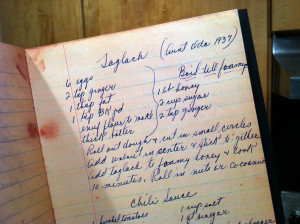Tonight at sundown in the Jewish tradition we begin a new year. It is Rosh Hashanah. I’ve never felt terribly comfortable writing about faith traditions that are not my own, but a few days ago, thanks to mutual friend Paula Marie Gourley, I found this piece of writing about Rosh Hashanah that I rather liked. It’s by Julius Lester. I asked Paula to ask Julius if I could reprint here for you in the Convivio Book of Days, and Julius said yes. I suppose that makes Julius Lester our first guest blogger here in this Book of Days. This is all right by me. I am honored to have his words here, and I hope you take them to heart, learn from them, send them out further. ~ John
Rosh Hashanah begins Wednesday night, September 20.
ROSH HASHANAH IS NOT “HAPPY NEW YEAR”
I don’t like it when gentile and Jewish friends greet me at Rosh Hashanah with “Happy New Year.” Rosh Hashanah is not the Jewish equivalent of January 1.
But I have never understood what “Happy New Year” is supposed to mean. I’ve never been sure that I want to be wished happiness. I’m not sure I know what happiness is, or that it is as important as we think. Happiness feels better than misery, but some of the most significant periods of my life have been the ones of profound unhappiness. For all the feelings of well-being that happiness bestows upon us, it is not a goal of life. I may spend the next year totally depressed, but that may be where I need to be in my life. A better greeting at Rosh Hashanah is “May you have a sweet and good year.” Even if the next year is a difficult one for me, it may be a good year, even a sweet one, even though it feels otherwise.
There is another aspect to Rosh Hashanah. It is also known as hayom harat olam––“the birthday of the world.” On our birthdays we mark our passage through time. One year of our lives has ended; a new one has begun. Rosh Hashanah is an invitation to mark the passages through time that have taken place in our world, and how big or inclusive “our world” is depends on the person. On birthdays we celebrate what has been and anticipate with joy what is to come.
The ten days from Rosh Hashanah to Yom Kippur are called Yamim Noraim––“Days of Awe.” It is a space in time for reflection, a time to withdraw energy from the world in order to renew one’s love for the world. We withdraw from the world in order to become more conscious of who we are and what our relationship to the world has been during the previous year. It is a way of celebrating the world, not by blowing noisemakers and getting drunk, but by taking responsibility for who we are in the world, because, in the deepest sense we are the world.
It would be incredible if, once a year, for ten days, the world would close up. The television and radio stations would go off the air (and ten days without hearing anything about Donald Trump would be purifying). Newspapers would stop publishing; the internet would shut off (though sales of tranquilizers would sky rocket just to quiet my anxieties as I suffered through internet withdrawal); companies would pay employees not to come to work, stores not selling essentials like food would be closed.
For ten days people would reflect on and talk to each other about what they had done to the world over the previous twelve months. What had they done that contributed to easing suffering of any kind? What had they done that contributed to increasing joy of any kind? And what could they do in the coming year to alleviate needless pain and contribute to senseless joy?
I know. I am an unreconstructed and unrepentant idealist. But so are Rosh Hashanah and Yamim Noraim. They hold before us unattainable ideals which we must strive toward if we are going to be as fully and wonderfully human as is within our grasp.
The greeting I prefer at this time of the year is L’shanah Tovah. Literally, it means “To a good year.” This leads me, at least, to reflect on what is “good,” which creates possibilities for new ways of being, creative ways of doing. However, if one is not comfortable with Hebrew, say “Have a sweet year,” or “Have a prosperous and sweet year,” or anything that comes from your heart. But please save “Happy New Year” for December and January.
Julius Lester has had a long, amazing career. He has published over 40 books, recorded two albums, hosted a couple of radio shows in New York City, taught at the University of Massachusetts Amherst, and has won numerous prestigious book awards. Had I known all this before reading his essay on Rosh Hashanah, I probably would have hesitated to ask Paula to ask him if he’d share his words with us. Thank you, Julius, for your generosity. Thank you, Paula, for the connexion. I was going to use one of her photographs, of apples and hazelnuts, to accompany Julius’s essay, but technical issues prevent me. Instead, here’s a photo we’ve used in the past for Rosh Hashanah: It’s a recipe for Aunt Ida’s Taglach from Pearl Silman’s handwritten recipe book. A few years ago Pearl’s daughter Rita asked me to make facsimile copies of the book for her children, Pearl’s grandkids. I couldn’t resist making a copy for myself, too. May you have a good and sweet year.
Essay © 2017 Julius Lester.
